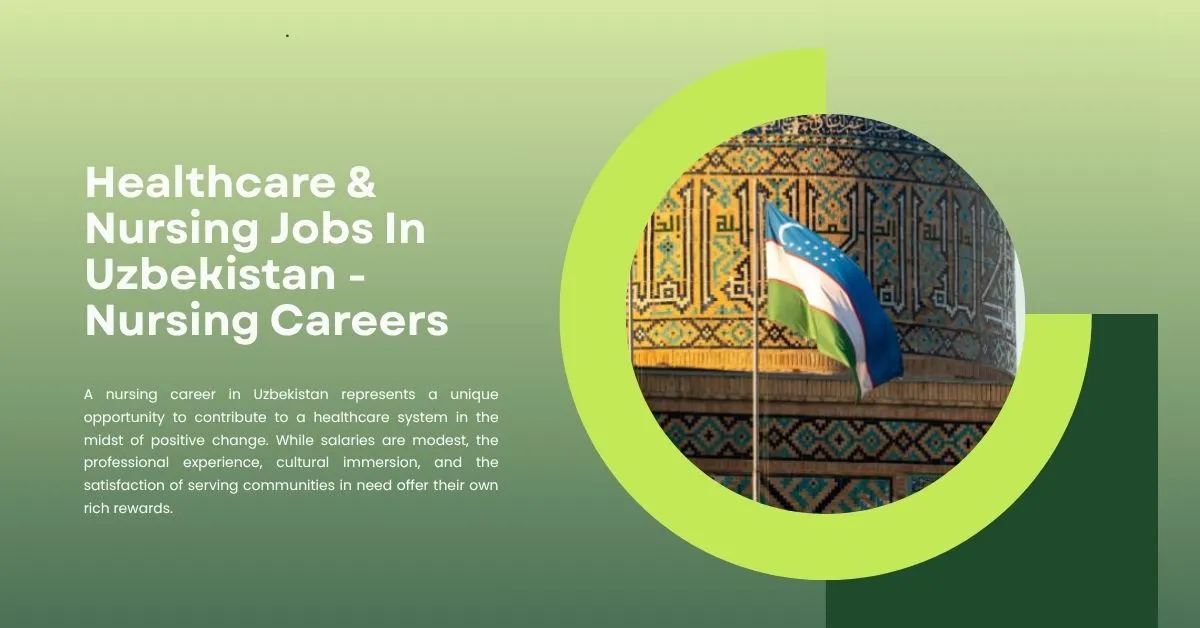Discover the unique opportunity to grow your nursing career in the heart of Central Asia, where ancient history meets a rapidly modernizing healthcare system. Uzbekistan is actively seeking skilled and compassionate nurses to join its journey toward better patient care.
While the financial rewards are developing, with monthly salaries ranging from 1.4 million to 4.4 million Uzbekistani soums, the true value lies in the profound cultural experience and the chance to make a tangible impact in a growing medical landscape.
From state-of-the-art private clinics in Tashkent to essential community health roles in rural areas, your skills are needed and valued. If you are adaptable, eager to learn, and driven by the reward of service, Uzbekistan offers a professionally enriching path less traveled.
The Evolving Healthcare Landscape:
The government is actively investing in hospital upgrades, medical equipment, and workforce training. While challenges remain, particularly in rural areas, this evolution opens new avenues for nurses. Opportunities exist not only in public hospitals but also in an expanding network of private clinics, international medical centers, and NGOs, especially in urban hubs like Tashkent, Samarkand, and Bukhara.
Current Nursing Roles in Demand:
The job market offers a mix of traditional and specialized roles:
- General Nurses: For inpatient wards, outpatient clinics, and emergency departments.
- Specialized Nurses: In high demand for ICU, surgery, pediatrics, and obstetrics.
- Community Health Workers: Focused on preventive care and public health education in rural areas.
- Medical Assistants & Technicians: Supporting diagnostic and rehabilitation services.
Check Also: Healthcare & Nursing Jobs in Lithuania
Top Healthcare Employers in Uzbekistan:
Knowing where to apply is crucial. Here are the key types of employers:
| Employer Type | Examples | Best For |
|---|---|---|
| Major Public Hospitals | Tashkent City Medical Center, Republican Specialized Centers | Gaining broad, hands-on experience in a high-volume setting. |
| Private Clinic Networks | Akfa Medline, Horev Medical Center | Better salaries, modern facilities, and a faster-paced environment. |
| International & High-End Centers | Shox International Hospital | Working with international patients and advanced surgical units. |
| Regional Public Hospitals | Various regional and district hospitals | Becoming highly adaptable and making a direct impact in communities. |
| NGOs & Health Projects | Red Crescent, WHO, MSF | Public health campaigns, vaccination drives, and rural outreach. |
Pro Tip: While online applications are common, a proactive approach, such as a professional in-person visit to the HR department with your CV, can sometimes be advantageous.
Essential Qualifications & Licensing:
To work as a nurse in Uzbekistan, you must meet these core requirements:
- Educational Background: A nursing diploma or degree from a recognized institution.
- Professional Licensing: A valid nursing license:
- For locals: From the Uzbek Ministry of Health.
- For international nurses: Your foreign qualification and license must be officially recognized and accredited by the Uzbek Ministry of Health. This process requires translated and notarized copies of your diplomas, license, and proof of experience.
- Language Skills: Proficiency in Uzbek or Russian is essential for most public hospitals and clinics. English is a valuable asset in private and international facilities.
- Experience: 1–3 years of experience is preferred, with specialized skills (ICU, ER) being highly valued.
Salary Expectations & Benefits:
Nursing salaries in Uzbekistan are modest but must be considered alongside the lower cost of living.
- Salary Range: Typically between 1.4 million UZS to 4.4 million UZS per month.
- Key Influencing Factors:
- Location: Salaries in Tashkent are higher than in rural areas.
- Employer: Private clinics and international centers offer better pay than public hospitals.
- Specialization & Experience: ICU, surgical, and emergency nurses command higher wages.
- Common Benefits: Can include paid vacation, sick leave, limited bonuses, and sometimes transport allowances or subsidized accommodation, especially in rural postings.
How to Apply for Healthcare & Nursing Jobs In Uzbekistan?
- For International Nurses: Start Early. Begin the foreign qualification recognition process with the Ministry of Health well in advance. Simultaneously, start learning basic Uzbek or Russian.
- Prepare Your Documents. Have your CV, diplomas, licenses, and reference letters ready. Get official translations if applicable.
- Search for jobs. Monitor the career pages of top employers (listed above) and use local job portals. Network with professionals in the field.
- Submit Applications. Tailor your CV and cover letter for each role, highlighting relevant experience and language skills.
- Interview. Be prepared to discuss your clinical experience, adaptability, and motivation for working in Uzbekistan’s healthcare system.
Conclusion:
Pursuing a nursing career in Uzbekistan is a decision that blends professional purpose with cultural immersion. While the salary structure is still evolving, the low cost of living, the high demand for qualified professionals, and the satisfaction of contributing to a transforming healthcare system create a compelling proposition.
For local and international nurses alike, the landscape offers diverse opportunities across public, private, and NGO sectors. By securing the necessary qualifications and embracing the local language and culture, you can build a rewarding career and play a vital role in the health and well-being of communities across Uzbekistan.
Frequently Asked Questions:
What is the average salary for a nurse in Uzbekistan?
The monthly salary for nurses typically ranges from 1.4 million to 4.4 million Uzbekistani soums (UZS). Experienced nurses in private clinics in major cities like Tashkent earn at the higher end of this scale.
Is knowledge of Uzbek or Russian required?
Yes, proficiency in Uzbek or Russian is essential for most roles in public hospitals and many private clinics. While some international clinics may use English, knowing the local language significantly improves job prospects and daily effectiveness

